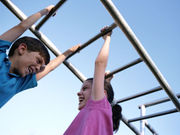Low density found in 6 percent of those with allergy compared to 0 percent of childen without allergy
THURSDAY, April 21, 2016 (HealthDay News) — Children who are allergic to cow’s milk may have lower bone mineral density than those with other food allergies, according to a study published online April 20 in Pediatrics.
Genevieve Mailhot, Ph.D., R.D., of the CHU Sainte-Justine Research Center at the University of Montreal, and colleagues recruited 81 prepubertal children with food allergies. Fifty-two had cow’s milk allergy, while 29 had allergies to foods other than milk. The researchers measured the children’s bone mineral density using standard testing. They also took blood samples to assess levels of vitamin D. In addition, they recorded calcium and vitamin D intake and tracked compliance in those advised to take supplements.
While low bone mineral density was found in 6 percent of those with cow’s milk allergies, none of those in the other group had low bone density, the researchers found. The children with cow’s milk allergies also had lower average calcium intake — 930 mg a day compared to 1,435 in the other group. Vitamin D intake in both groups was well below the recommended 600 IU a day. Few with the cow’s milk allergies took supplements — 37 percent reported taking calcium and 44 percent reported taking vitamin D. However, those who did take a supplement averaged more than five days a week, which was termed good compliance.
“Prepubertal children with persistent cow’s milk allergy have a lower bone mineral density and calcium intake compared with similarly aged children with food allergies other than cow’s milk,” Mailhot told HealthDay.
Full Text (subscription or payment may be required)
Copyright © 2016 HealthDay. All rights reserved.








